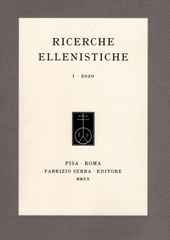Ricerche ellenistiche
Secondo la partizione convenzionale della storia greca, con la morte di Alessandro Magno si inaugura un periodo nuovo e complesso che dopo Johann Gustav Droysen chiamiamo 'Ellenismo'. Ampliamento degli orizzonti, riscrittura delle frontiere, trasformazioni politiche, sperimentazioni culturali: sono solo alcuni dei molti aspetti peculiari che caratterizzano questa lunga fase e che hanno particolarmente sollecitato la ricerca scientifica di questi ultimi anni, forse anche per le risonanze con temi centrali dell'età contemporanea.
«Ricerche ellenistiche» intende contribuire a questa riflessione a partire da una nozione ampia di Ellenismo, che si estende sia alle figure che lo hanno storicamente determinato (Filippo e Alessandro), sia alle esperienze culturali che in piena età romano-imperiale hanno continuato a guardare al paradigma della grecità. E in ragione della profonda interazione fra esperienze e prospettive che caratterizzano questo ampio arco cronologico, la rivista accoglie contributi di storia e di epigrafia (con discussione di temi già noti o presentazione di nuovi documenti), ma anche di letteratura, filosofia, archeologia e storia dell'arte, nel tentativo di incoraggiare il dialogo fra discipline e competenze. «Ricerche ellenistiche» accetta contributi in italiano, inglese, tedesco, francese, spagnolo. Tutti gli articoli sono sottoposti a un processo di peer-review; l'elenco completo dei revisori viene reso noto ogni tre anni. [Testo dell'editore]
According to the conventional division of Greek history, the death of Alexander the Great ushered in a new and complex period which (after Johann Gustav Droysen) we call ‘Hellenism'. Broadening horizons, recreation of borders, political transformations, cultural experiments: these are just some of the many distinctive aspects of this long phase that have particularly stimulated scientific research in recent years, perhaps due to their resonance with important topics today.
«Ricerche ellenistiche» contributes to these considerations starting from a broad notion of Hellenism, extending both to Philip and Alexander, the figures who historically brought it about, and to various cultural experiences that even during the Roman Empire continued to look to the paradigm of Grecism. Thanks to the profound interaction between experiences and perspectives that characterize this long chronological period, the journal offers not only articles on history and epigraphy (with discussion of well-known themes or presentation of new documents), but also on literature, philosophy, archeology and art history, in hopes of stimulating dialogue between disciplines and skills. The journal accepts articles written in Italian, English, German, French, and Spanish. All articles are subject to the peer-review process; a complete list of referees is published every three years. [Publisher's text]
-
Fascicules de la même revue (disponibles individuellement)
-
Informations
ISSN: 2704-8292
FRÉQUENCE
Annuale = Annual
CLASSIFICATION ANVUR
ANVUR: Area 10, Fascia S
DISCIPLINES


